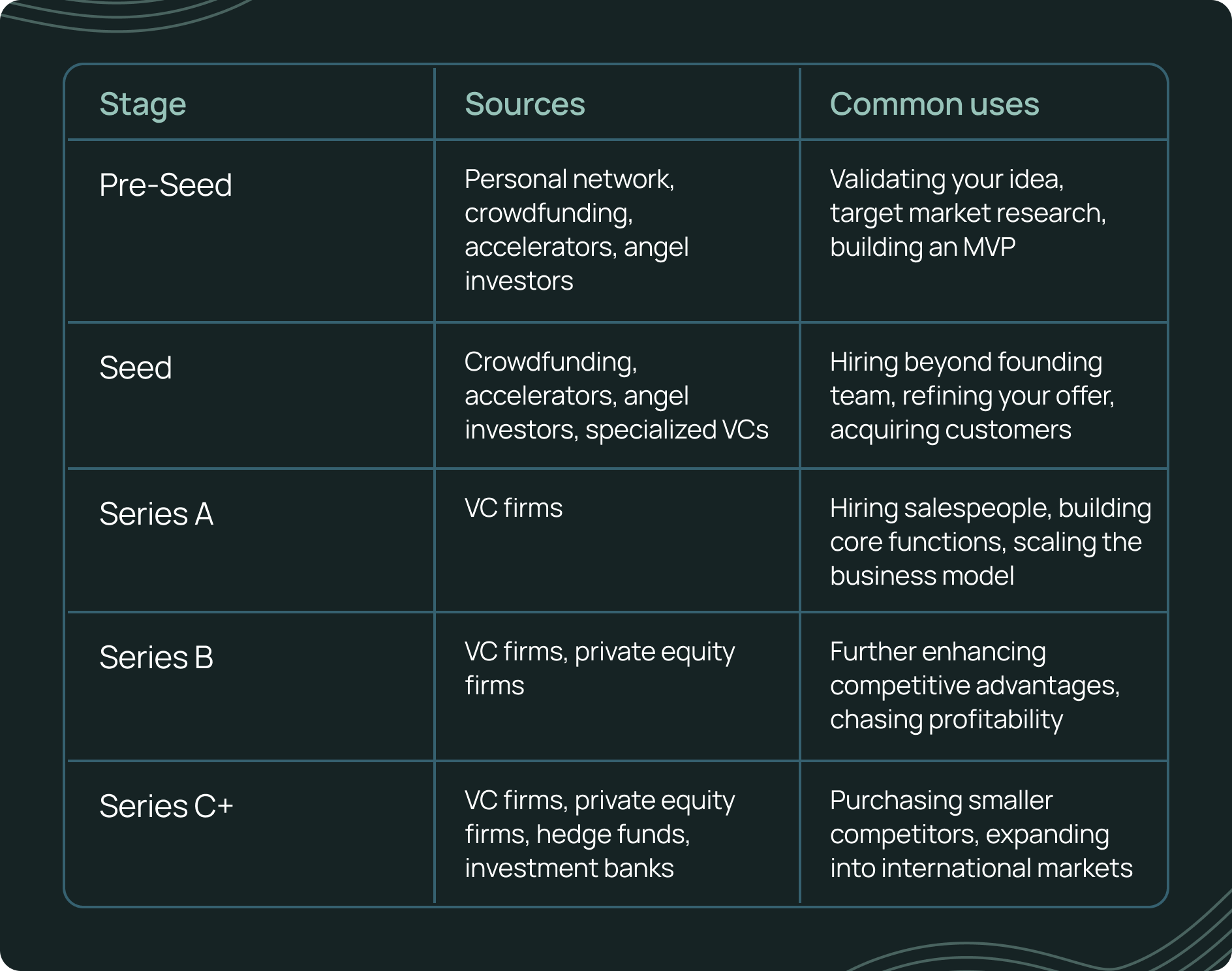Venture capital is the key to rapid growth for tech startups. In addition to providing the funds you need to scale, it can also bring invaluable networking connections and strategic guidance.
In this guide, we’ll explore how to raise venture capital for a tech startup, step-by-step.
1. Startup funding stages: know your stage
The nature of your relationship to venture capital (VC) financing is often highly dependent on your startup funding stage. As a result, the first step in fundraising is to determine which one currently describes your startup. Here’s how they work.

Pre-Seed
The pre-seed stage is the first startup funding stage. Typically, you haven’t developed your formal offering yet. Instead, you’re usually focusing on doing market research and putting together a minimum viable product (MVP).
As a result, most pre-seed companies are also pre-revenue, so prospective lenders and investors can’t always use financial performance to inform their decisions. They have to rely more on the strength of your founding team and the quality of your business plan.
While some venture capital firms may be willing to work with these companies, pre seed funding more often comes from other sources. For example, that includes friends and family, angel investors, and accelerators.
Seed
The seed funding stage sits between the pre-seed stage and the priced rounds. By this point, startups have typically established their MVP and gained some initial traction, though they’re unlikely to be profitable.
However, the gap between seed and pre-seed isn’t the largest. You may have had some early financial wins, but you’re still a risky prospect. As a result, funding typically comes from many of the same sources, such as:
- Accelerators
- Angel investors
- Equity crowdfunding platforms
- Specialized venture capitalists
Founders often use seed capital to capitalize on whatever momentum has been established. For example, that might involve further refining the offering or expanding the sales team to accelerate customer acquisition.
Series A
Series A is the first priced round and a significant milestone for any startup. It typically marks the point where you transition from developing something people will pay for to scaling a successful business model.
As a result, founders often use Series A funding to expand core functions, allowing operations to support a broader customer base.
There’s also a notable increase in the size of the typical VC investment, with the average being $12 million as of Q3 2024, according to Carta data.
Unlike in the earlier stages, you can typically expect Series A funding to come from a venture capital firm. However, they’ll expect you to have a well-developed product and proven demand for your product in the form of real customers.
Series B
Series B is the second priced round and another huge milestone for your startup. Reaching Series A is no guarantee that you’ll make the transition to the next stage.
By a Series B funding round, your startup should be well established. You should expect to have reliable revenue, a significant customer base, and a clear growth path. Your goal typically shifts to becoming a leader in your market.
Like Series A, Series B funding typically comes from a venture capital fund. While you may see some contributions from those who participated in previous rounds, it’s common that the bulk of your funding will come from different investors.
There’s also another significant jump in venture capital investment size, with the average Series B round raising roughly $26.2 million in Q3 2024, according to Carta data.
Series C+
Series C is the third priced round, at which point you’re getting into late-stage funding. Startups who make it to this stage of development have typically captured a significant market share, establishing themselves as industry leaders.
As a result, these startups are typically focused on even more aggressive expansion efforts. For example, you might use your Series C proceeds to acquire smaller competitors, develop brand new offerings, or enter international markets.
While venture capital firms still participate in Series C rounds and beyond, you’ll also see private equity funds, hedge funds, and investment banks get involved. Typically, they’ll be looking for a clear path to profitability.
As you’d expect, funding rounds take another leap in size at Series C. In Q3 2024, Carta data indicated that the average was around $55 million.
2. Venture capital types: know what to raise
VC funding can come in several different forms. As a result, the next step in raising it is to determine which kind suits your preferences and stage of development. Here are the primary options to consider.
Equity
Equity financing is what the typical tech startup founder probably imagines when they picture venture funding. It involves selling a percentage of the ownership of your company to a VC investor.
As a result, it doesn’t impose an immediate financial burden. You don’t have to make principal or interest payments like you would with business loans. However, it’s usually more expensive than debt in the long run, so it should be used strategically.
Beyond financing, the benefit of raising venture capital by issuing equity is that your investor becomes incentivized to help you succeed. That often means gaining access to their strategic guidance and connections, which can be significant.
The priced rounds, such as Series A, Series B, and Series C, are a form of equity financing.
Debt financing
Debt financing allows you to raise startup capital without giving up any ownership in your startup and retaining complete control. Instead of selling equity, it involves borrowing money and repaying it plus interest over time.
While typically cheaper than equity in the long run, it can create an immediate financial pressure if you have to start making principal and interest payments right away.
In practice, debt in the context of venture capital looks like venture debt. Venture debt is reserved for startups that have already secured venture capital backing. It’s often used to extend your cash runway between priced rounds.
Venture debt is often more expensive than traditional debt, but it also tends to be more flexible. Typically, each loan is highly customized to the borrower.
SAFEs and convertible notes
SAFE notes and convertible notes are among most popular forms of financing among early stage startups, including seed and pre-seed startups. Their main advantage is that they allow you to raise money quickly without having a set valuation.
Convertible notes were developed first. They get their name from the fact that they function like debt initially, but allow the noteholder to convert their investment into equity after a certain trigger event. Typically, that’s the next priced round.
While convertible notes typically don’t require monthly payments, they still accrue interest while they remain outstanding. If you make it to a note’s maturity date without a triggering event, the noteholder can demand repayment.
SAFEs, short for Simple Agreements for Future Equity, were developed later to function like convertible notes without the debt component.
Not only does that lessen the financial risk to the startup issuing them, but it also removes the burden of compliance with debt regulations.
3. Identify the right investors
Once you understand the most appropriate type of funding option for your current stage of development, you can identify which kinds of investors you should be pursuing. Aim for those who invest in tech companies at your stage of development.
Fortunately, you’ll often find that venture investors share some of their portfolio companies publicly, which can help guide your search. However, digital outreach may not be sufficient. In many cases, networking is necessary to find a venture partner.
Depending on your stage of development, many different approaches can work. If you’ve gone through an accelerator, they can be an excellent source of connections. You can also try getting into industry events, such as demo days.
Look for professional investors who bring more than capital to the table. Ideally, the right investor should have extensive experience with tech companies and connections that could prove useful in future funding stages.
4. Prepare your financials & presentation
Every potential investor will want to see your financial statements, especially the further you progress through the funding stages. While they may not be expected at the pre-seed stage, they definitely will be by your first priced round.
As a result, proper financial reporting is essential for tech startups. The sooner you organize your efforts, the better. Typically, investors will want to see financial statements that comply with Generally Accepted Accounting Principles (GAAP).
This helps ensure they capture an accurate and consistent representation of your business’s performance and position. However, it can be challenging, especially as your startup’s finances become more complex.
Eventually, managing your finances on top of all your other responsibilities as a founder becomes overwhelming.
At this point, strategic partnership with a financial expert like Zeni becomes invaluable. We can help ensure your financial statements are always accurate, GAAP-compliant, and ready for presentation to investors.
5. Negotiate the deal
At the early stages of startup development, deal negotiations are often relatively straightforward. SAFEs and convertible notes don’t require a valuation and are designed to help startups raise capital quickly.
However, venture capital deals are another story. Negotiations typically begin with a term sheet. It’s a non-binding document that outlines the key terms of a prospective investment, serving as a basis for initial discussions before drawing up official contracts.
For example, term sheets often address issues like:
- Shareholder liquidation preferences
- The buyer’s proposed valuation of your company
- How much capital the investor intends to contribute
- Control rights afforded to investors and founders
Once again, it’s a good idea to hire expert help during this step, at least in the later startup funding stages.
Managing capitalization tables and dilution can be highly complex, so consider working with a lawyer or another advisor with experience raising capital.
6. Undergo due diligence
Once you’ve agreed on matters like valuation and liquidation rights, investors will typically request a due diligence period.
During this time, they’ll review your financial records, legal documents, customer contracts, and other key documents to validate the information presented during negotiations.
Ideally, you want to keep surprises to a minimum for potential venture capital investors. At this stage, they should primarily be confirming what they already know, not uncovering new issues that could delay or derail the deal.
The length of the due diligence period varies, but it often lasts several weeks to a few months. Try not to let the process drag on unnecessarily. That can be costly and create deal fatigue, which may pressure you into accepting less favorable terms.
Your accountant and legal advisor should both be closely involved to ensure everything on the due diligence checklist goes smoothly.
7. Close the deal
Once due diligence is complete, the final step is closing the deal. This involves signing definitive agreements to formalize terms, transferring funds, and updating your company’s cap table to reflect the new ownership structure.
The closing process can move quickly once diligence is wrapped up, but timelines may vary depending on the complexity of the deal and the responsiveness of both parties.
In some cases, closing takes just a few weeks. In others, it may stretch longer if negotiations or documentation require more back-and-forth.
Let Zeni help as you raise capital
Zeni is a comprehensive financial management platform custom-built for startups. We offer everything you need at each step of the fundraising process, including bookkeeping, business tax, and fractional CFO services.
Whether you need help getting your books ready for venture capital funding or strategic guidance during the due diligence process, Zeni can help. Schedule your free consultation today.




.png)

.webp)
.avif)

